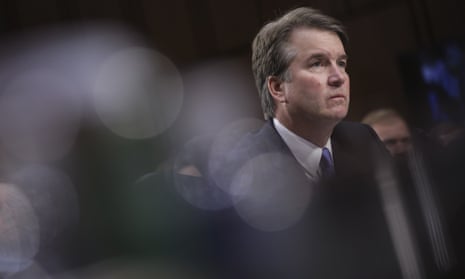The allegations of sexual misconduct by the supreme court nominee Brett Kavanaugh as a teenager have roiled Washington.
While it is unclear if they will stymie his nomination, it has hardened the opposition of potentially wavering Democrats and might even expand the number of Republicans on the fence.
Kavanuagh had long been a political lightning rod even before Christine Blasey Ford came forward publicly to allege a drunken Kavanaugh had pinned her on a bed, groped her and covered her mouth with his hand when he was 17 years old.
His nomination has been the subject of political trench warfare since it was announced in July. A number of Democrats instantly declared their opposition to him and have warned he would overturn Roe v Wade, which provided a constitutional guarantee of abortion rights, while also questioning his views on executive power.
Even before Ford came forward, Kavanaugh’s confirmation vote was likely to be one of the closest in modern American history, with senators divided almost entirely along party lines in a chamber where Republicans hold a slim 51-49 majority. However, Kavanaugh had been expected to be confirmed by the Senate judiciary committee scheduled to vote on his nomination on Thursday and the full Senate expected to vote the week after.
The immediate effect of the allegation has been to harden Democratic opposition. Three red state Democrats facing re-election in 2018 voted for the nomination of Neil Gorsuch in 2017: Joe Donnelly of Indiana, Heidi Heitkamp of North Dakota and Joe Manchin of West Virginia.
Donnelly has now joined fellow Democrats is calling for the Senate judiciary committee to delay its scheduled vote later this week. In a statement, he said: “The allegations made against Judge Kavanaugh are serious and merit further review.”
Both Manchin and Heitkamp have called for Ford and Kavanaugh to testify without weighing on whether the vote should be delayed. Manchin tweeted: “Professor Christine Blasey Ford deserves to be heard and Judge Kavanaugh deserves a chance to clear his name”, while Heitkamp has also called for Ford to “be given an opportunity to testify before the committee as well”.
Further, Doug Jones of Alabama, a Democrat elected to the Senate in a special election, said on Twitter on Sunday: “It is more important than ever to hit the pause button on Kavanaugh’s confirmation vote until we can fully investigate these serious and disturbing allegations. We cannot rush to move forward under this cloud.”
Kavanaugh does not need the support of a single Democrat to be confirmed. However, he can only lose a single Republican. The two considered most likely to cross lines are Susan Collins of Maine and Lisa Murkowski of Alaska. Both are considered comparative moderates and support abortion rights.

However, before Ford’s allegations, it was unlikely that they would both break ranks. Murkowski has yet to comment publicly while Collins tweeted on Monday afternoon: “Professor Ford and Judge Kavanaugh should both testify under oath before the Judiciary Committee.”
In the past day, though, one more Republican has emerged as a potential roadblock. Jeff Flake of Arizona serves on the judiciary committee, which has a narrow 11-10 Republican majority. He told the Washington Post on Sunday: “I’ve made it clear that I’m not comfortable moving ahead with the vote on Thursday if we have not heard her side of the story or explored this further.”
If Flake votes against Kavanaugh’s nomination in committee, it is not doomed. The Senate majority leader, Mitch McConnell, could still bring it up on the Senate floor with an unfavorable report but his prospects under those circumstances would probably be grim. However, such a scenario is unlikely.
Chuck Grassley, the chairman of the judiciary committee, has said in a statement the first step before any testimony would be background investigation calls with Kavanaugh and Ford but that Democrats had so far not been cooperating. Those calls would be a first step towards any testimony and would give senators initial information to review before the scheduled committee vote on Thursday.
The question is whether that process would be enough to ease Republican concerns and avoid the spectacle of public testimony, which would probably do severe political damage to the GOP on the eve of the 2018 midterms. Kavanaugh could still be confirmed on narrow partisan lines, but it would probably shift the political cost from red state Democrats to blue state Republicans.
